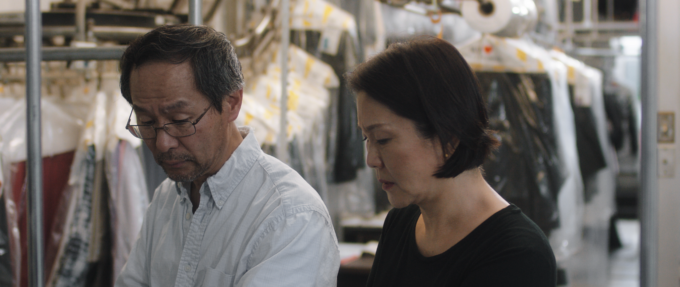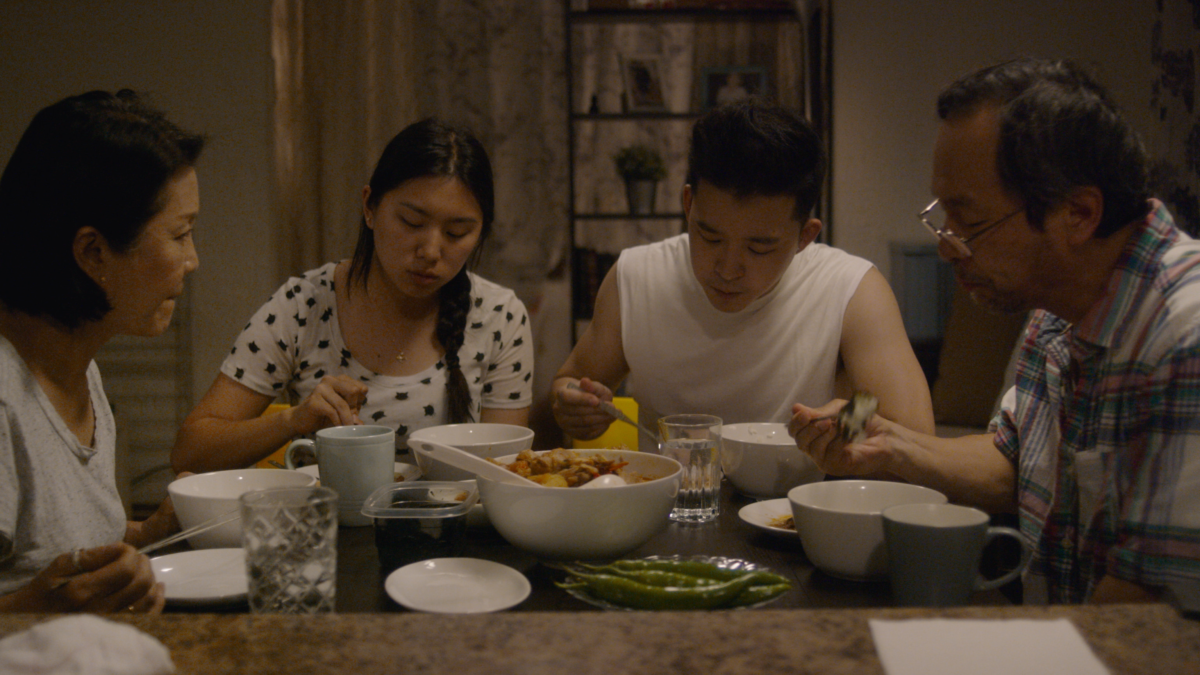Written By: Michelle Ahn
“Happy Cleaners” starts off with chaos — a family fight over the dinner table about a rebellious son’s dream to follow his passion, and a stubborn mom’s philosophy that the only path to success is higher education. The film quickly changes pace and while the drama continues, the thematic elements unfold so subtly that you forget it started off with a bang.
The film follows the slice of life of the Choi family in Flushing, New York, who is struggling to make ends meet as the prospect of a lease renewal for their dry cleaning business is left up in the air under new management. It’s a story that hits a bit too close to home for many in an ever-changing community, such as Flushing.
The backdrop makes sense for co-directors Julian Kim and Peter S. Lee who are native to the area and have formed a “creative brotherhood” specializing in stories about Flushing. “It started off as a journey to find our gohyang, our hometown. How did this place really shape who we are?” (Both Kim and Lee currently reside in Bayside, or as Lee puts it, “We didn’t get very far.”)
While the film brings Flushing to life as a character on its own, it’s not completely an autobiography for the duo. Instead, Kim and Lee took inspiration from their friends and the community they grew up in, calling it “a collective experience.” In the earlier drafts, they focused on Kevin’s narrative, a character they can relate to best as sons themselves. Soon, they realized Kevin’s narrative anchor wasn’t needed to share the “collective experience,” and an ensemble version was solidified. “It was like a beautiful accident where we didn’t intend it to be but it just turned out well,” Kim tells me over the phone.
Perhaps it is due to this “beautiful accident,” but the entire film feels extremely natural, and therefore relatable. There’s a level of authenticity to the film that gives the film a lot of heart. “We wanted to tell a story where our family and our life was being portrayed authentically,” Kim tells me. “And we were like let’s not try to make it magical … Just a true slice of life of our day to day struggle, our day to day survival really.” This simplicity in approach allows the characters’ actions and words to unravel seamlessly, letting the story unfold on its own. These raw moments feel effortless. But each detail was a creatively intentioned and conscious decision, which may make “Happy Cleaners” Kim and Lee’s finest work yet.
A prime example of this authenticity is in the film’s cast. Finding three different generations of bilingual actors with English skills that closely reflect the community is no easy feat. Through a lot of asking around and help from the Korean American Story (an executive producer on the film), Kim and Lee were able to find the perfect fit for each role. “We had a theory that there’s gonna be probably people in our parents’ generation or older who, in their 20s, might have been wanting to be an actor or was an actor at some point,” says Lee. Yun Jeong (Kevin), Yeena Sung (Hyunny), and Charles Ryu (Dad) play the rebellious son, dutiful daughter, and hardworking father with ease. However, the real star of the film may be Hyanghwa Lim (Mom) who plays the anti-hero.

On screen, Lim brings a sense of life and relatability to her character. She becomes all of our moms at one point or another. At times, we don’t understand her more traditional approaches to life, but we can’t hate her. In fact, we grow more attached to her as the film progresses and we come to see her as our best friend. Lim has actually trained as a stage actress 40 years ago in South Korea, proving Kim and Lee’s initial hypothesis.
As the authenticity and subtlety of thematic elements unveil on screen, the shifting identities created within a multigenerational immigrant family become a prominent theme. Cultural differences are incorporated in every scene, primarily displayed through Kevin’s relationship with his parents. Kim tells me, “It’s a weird mixture juggling between going out speaking English to our friends and peers and coming home and, you know, being all Korean and being intertwined with these two cultures.” It’s something immigrant families experience everyday and a divide that I too, as a Korean American, sense within my own family. But Kim brings up a good point: “I’m not sure what the next generation is going to identify ourselves (Korean Americans) as. I think our goal is we should all just be American.”
And American is what Kim and Lee attempt to define through this immigrant family’s tale. There is an uncomfortable scene in the middle of the film when Kevin confronts his parents for not standing up for themselves in front of a white customer. It’s frustrating because we all know the model minority, passive stereotype the Asian community receives. While it’s a quick scene, it’s a moment that stays with you until the end credits roll. Lee tells me it’s a frequent experience he has in his own family. “They’re just so used to it (racial prejudices) that it doesn’t matter to them. They just kind of see it as something they have to get around somehow.”
By portraying the on-screen racial tensions and cultural clashes that can arise within immigrant families, Lee hopes that discussion can occur off-screen. “How do we overcome sort of our struggle and in another step, think about how we can be allies for others who have it worse than us?” Kim further elaborates, “It was really an effort to make sure we are not being a colorless America where we’re not seeing color, but rather a colorful America where we are embracing color.” While “Happy Cleaners” just sheds light on a small community level of Flushing Korean Americans, it’s still one color Kim and Lee hoped to paint. “That makes up for part of what America’s narrative is.”
In the end, this project starts and ends in Flushing. Throughout my conversation with Kim and Lee, they were constantly humbled by the overwhelming support and encouragement they received from their communities. Whether it was through unofficial help, such as spreading the word about their film, or a tremendously successful Kickstarter campaign that hit its initial goal in just 24 hours and ultimately outstanding their original goal by 325%, Kim and Lee state the film was only made possible thanks to the community. “I really don’t want to sound cheesy by saying this, but we really asked the community and the community answered,” they quietly laugh as they tell me.
And they also make it a point to give a shoutout to John Woo, executive director of Asian CineVision. “And for Asian Cinevision they were there from the very get-go when we started our career.” When Kim and Lee first launched their Flushing web-series, Asian CineVision included their work in their festival at a screening in Flushing Town Hall, giving them a platform. “It was like a big community screening and we were so overwhelmed and so humbled by that experience. I think it motivated us.”
“Happy Cleaners” returns to Asian CineVision’s screen by closing its annual hallmark event, the Asian American International Film Festival, on August 3rd at the Asia Society in New York City. “We’re so thrilled and honored that we were given this opportunity to do that.”
With a film that is true to its form, we can only wonder what other stories Kim and Lee have still to tell. Itching to get back to set every time they’re in post production, Kim and Lee already have many projects in development. “We’ll just keep developing and just wanting to keep working on telling our community’s stories.” And that’s what sets these two apart from the others. They tell the truth that they know, and while they create to give back to a small community of Korean Americans in Flushing, New York, by doing so, they end up touching hearts outside their hometown as well.
Happy Cleaners
buy tickets*
Saturday, August 3, 2019 7:00 pm
Asia Society
Directors/Writers: Julian Kim and Peter S. Lee
Stars: Hyanghwa Lim, Charles Ryu, Yun Jeong, Yeena Sung
Running Time: 1 hour 38 minutes
Genre: Narrative, Drama
*This event is sold out

